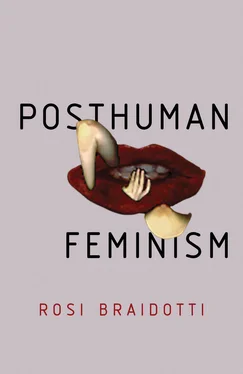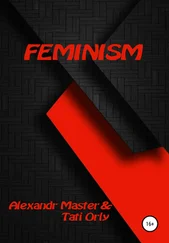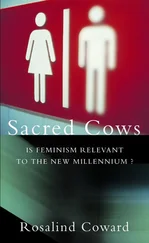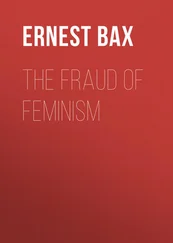The criticism of the limitations of classical humanism is the premise to the collective construction of acts of resistance, as well as the creation of alternative scenarios. My call is for a democratic participation of all in the discussion about what we are capable of becoming in this posthuman convergence; what the dangers of exclusion and discrimination might be; and how we can develop an ethics worthy of the complexities we are facing. Our ability to do so is directly proportional to our ability and willingness to learn from the failed promises and internal fractures of Eurocentric humanism and develop more inclusive practices (Armstrong and Montag, 2009). A posthuman relational ethics respects our species and cultures, while differentiating and recognizing the worth of the human community. It is a material but differential feminist ethics, that embraces a decolonial and anti-racist stand in assessing humanism from the perspective of those it excluded and tormented. It importantly also embraces the non- and the in-human entities as constitutive components of human subjectivity.
Transcendentalist claims to exceptionalism (such as found in transhumanism) are cut down to size through an emphasis on immanence and the recognition of our mutual interdependence. ‘We’ are definitely in this posthuman convergence together – in the injustices, the staggering technological developments, the epidemics and other environmental devastations, alongside promises of technological evolution. Our social imaginary is fraught with planetary anxieties and increasing contradictions. In such a context, rejecting human exceptionalism is a way of embracing the immanence of a life that we do not own. Life is not restricted to hegemonic ‘Man’, but includes his multiple, disposable and despised others. A posthuman approach avoids the recreation of a pan-humanity that would dialectically absorb these others into a new superintelligence project. It rather calls for differential, materially embedded accounts of the respective prices ‘we’ are prepared to pay for being and staying alive here and now.
1 1 This is changing nowadays in mainstream liberal feminism, however. For instance, international organizations like CEDAW (Convention on the Elimination of All Forms of Discrimination Against Women), are currently proposing a recommendation on women and climate change.
2 2 https://sheeo.world/about-us/credo/
3 3 https://www.girlboss.com/
4 4 https://www.theceomagazine.com/business/finance/the-rise-of-the-fempreneur/
5 5 https://www.investopedia.com/terms/m/mompreneur.asp
6 6 With thanks to Djurdja Trajkovic.
7 7 With thanks to Emily Jones.
8 8 Rottenberg signals that several Silicon Valley firms cover ‘the cost of egg freezing as part of their employees’ benefits package’ (2018: 97).
9 9 This digital database is produced by the reduction of a human corpse into thousands of tiny slices.
10 10 For critical overviews of feminism and postmodernism, see hooks (1990), Nicholson (1990), Braidotti (1991, 2010), Butler and Scott (1992), Johnson (1998), Grewal and Kaplan (2001) and Gamble (2004).
Конец ознакомительного фрагмента.
Текст предоставлен ООО «ЛитРес».
Прочитайте эту книгу целиком, купив полную легальную версию на ЛитРес.
Безопасно оплатить книгу можно банковской картой Visa, MasterCard, Maestro, со счета мобильного телефона, с платежного терминала, в салоне МТС или Связной, через PayPal, WebMoney, Яндекс.Деньги, QIWI Кошелек, бонусными картами или другим удобным Вам способом.












